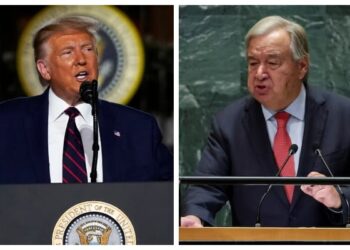After Donald Trump was inaugurated as the 45th president of the United States in January 2017, George Orwell’s classic novel “Nineteen Eighty-Four,” published in 1949, rapidly climbed to the top of Amazon’s bestseller list. This surge in interest reflected a widespread belief that Orwell’s work was particularly pertinent to the political climate of the time.
Fast forward nearly eight years, and once again, the nation is contemplating the possibility of a Trump presidency.
In 2016, many were taken aback by Trump’s unexpected victory, leading to a scramble to understand the potential effects of his presidency after the fact. However, now it seems more individuals are posing questions about what another Trump administration could mean well in advance of the election.
As a professor of philosophy and law, I’ve devoted considerable time to analyzing Orwell’s writings. I believe that eight years ago, people were correct in seeing Orwell’s insights as relevant to understanding a Trump presidency.
Here are three key insights drawn from Orwell’s work that Americans should consider as they gear up to vote for their next leader.
### Nationalism vs. Patriotism
In his 1945 essay “Notes on Nationalism,” Orwell explores the distinction between nationalism and patriotism. He defines nationalism as the inclination to identify personally with a specific nation or group, elevating it above all moral considerations and prioritizing its interests above everything else.
In contrast, he characterizes patriotism as a commitment to a specific place and way of life that one regards as exceptional but does not seek to impose on others.
To illustrate Orwell’s notion of patriotism, consider this analogy: many parents believe their children are the best. Yet, they don’t impose this belief on others or claim that every child should meet this particular standard. They appreciate their own children without devaluing others.
Orwell’s patron embodies this spirit of appreciation without aggression. They may view their culture or country as the best but have no desire to force their values on anyone else.
Nationalism, however, operates differently. Orwell writes that patriotism is inherently defensive, focusing on protection both militarily and culturally, while nationalism is intertwined with a yearning for power. Nationalists are like overzealous parents who attempt to elevate their children by disparaging others.
Loving one’s country isn’t a threat in itself; prioritizing its advancement above all else can be. Patriotism aligns with the former, while nationalism aligns with the latter.
Orwell insightfully notes that when nationalists prioritize their ideology, they often see it as transcending ethics. This can lead them to adopt questionable methods to promote their objectives.
A prime example of this mindset was Trump’s reaction after losing the 2020 election. He attempted to distort the election results through dishonesty and incited an insurrection to further his agenda.
The Capitol riot on January 6, 2021, was indicative of this nationalist mentality; participants sought to push their political agenda through unethical means.
Trump mirrors Orwell’s warning about nationalists, framing issues in terms of competition and prestige, fixating on wins and losses—what Orwell described as a toxic obsession.
### The Underestimation of Autocrats
In a 1942 essay reflecting on his experiences in the Spanish Civil War, Orwell expressed concern about misplaced optimism: “our traditions and our past security have given us a sentimental belief that it all comes right in the end.” He critiqued the notion that evil will ultimately self-destruct, arguing instead that positive social change requires sustained effort and vigilance against regression.
Orwell called out several intellectuals who dismissed Hitler as a caricature and criticized nations that thought Hitler was a minor nuisance until it was too late.
Many contemporary commentators have noted that Trump frequently employs language reminiscent of autocratic leaders. Yet, some Americans downplay these warning signs, failing to recognize them as serious threats to democracy. This reluctance seems rooted in a belief that such dire scenarios couldn’t happen in their own nation.
Orwell believed it was crucial to acknowledge the potential for malevolent outcomes. This forms the basis of his most notable works, “Animal Farm” and “Nineteen Eighty-Four.” It would serve Americans well to take potential threats to democracy seriously as well.
### Nationalism Can Emerge from Within
In “Nineteen Eighty-Four,” Orwell explores the implications of a governing party fully immersed in nationalism. The party members in the fictional superstate of Oceania fixate on “competitive prestige” and power. Rituals such as the “Two Minutes Hate”—where citizens are encouraged to vent their anger at a political adversary—illustrate how they focus exclusively on victories and humiliations.
A troubling aspect of this regime is its propensity to turn against its own members through acts of kidnapping, torture, and even execution, a fate known as being “vaporized.” Nationalists pose a danger not only to outsiders but also to anyone within the nation who opposes their ruthless pursuit of authority.
Trump’s threats against “enemies from within” reveal a commitment to silencing those he perceives as obstacles to his power. Orwell’s writings underscore the importance of taking such threats seriously.
As Americans prepare for the upcoming election, reflecting on these insights from Orwell can provide vital perspective on current events and future choices.





